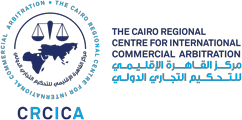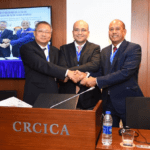
International Conference on The Belt and Road Initiative: Economic Legal Landscape and Dispute Settlement, 12 December 2017
Dec 12 2017
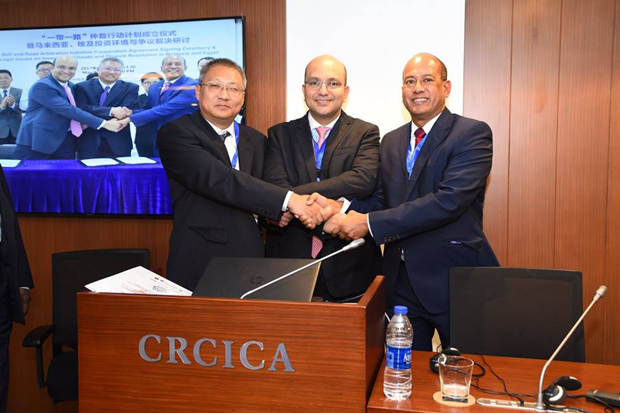 On 12 December 2017, CRCICA organized a significant conference on: The Belt and Road Initiative: Economic Legal Landscape and Dispute Settlement in collaboration with the Beijing International Arbitration Center (BIAC) and the Kuala Lumpur Regional Centre for Arbitration ( now the Asian International Arbitration Centre "AIAC"). The conference was sponsored by Shahid Law Firm. Institutional supporters were TEDA Suez, Al Tamimi & Co and Rizkana & Partners. Media partners were Xinhua News Agency (China’s prime news agency), GAR, TDM, The Law and Law Today.
Through an integral program, the conference sent a message of Afro-Asian solidarity in promoting China’s One Belt, One Road Initiative. The Keynote speech: “The Law and Economics of the Visionary OBOR Initiative: Prospects and Challenges” set the scenery. The first session displayed the legal environment in Egypt with regard to the B & R, and the second one arrayed the new prospects for international trade and industry out of both domestic and international perspectives. Particularly significant, this session was remotely attended by an expert speaker from Hong Kong who tackled the sustainability of OBOR economies and the Harmonization of Trade Law. Afterwards, the third session came to handle the financial and contractual framework of infrastructure development projects and the fourth one discussed the impact of the B & R initiative on the future of dispute settlement with specific focus on the BIAC/CRCICA/KLRCA Arbitration Initiative.
Attendees came from 14 different countries; Egypt, China, Malaysia, Sudan, France, Nigeria, Canada, Ireland, Qatar, Germany, Switzerland, Sweden, Hong Kong, and England. The professional profile of participants reflected many business sectors, mainly representing Chinese and Malaysian companies, including construction, oil and gas and telecommunication businesses. Private lawyers, diplomats, NGOs were also represented in the conference.
Conference Agenda.
On 12 December 2017, CRCICA organized a significant conference on: The Belt and Road Initiative: Economic Legal Landscape and Dispute Settlement in collaboration with the Beijing International Arbitration Center (BIAC) and the Kuala Lumpur Regional Centre for Arbitration ( now the Asian International Arbitration Centre "AIAC"). The conference was sponsored by Shahid Law Firm. Institutional supporters were TEDA Suez, Al Tamimi & Co and Rizkana & Partners. Media partners were Xinhua News Agency (China’s prime news agency), GAR, TDM, The Law and Law Today.
Through an integral program, the conference sent a message of Afro-Asian solidarity in promoting China’s One Belt, One Road Initiative. The Keynote speech: “The Law and Economics of the Visionary OBOR Initiative: Prospects and Challenges” set the scenery. The first session displayed the legal environment in Egypt with regard to the B & R, and the second one arrayed the new prospects for international trade and industry out of both domestic and international perspectives. Particularly significant, this session was remotely attended by an expert speaker from Hong Kong who tackled the sustainability of OBOR economies and the Harmonization of Trade Law. Afterwards, the third session came to handle the financial and contractual framework of infrastructure development projects and the fourth one discussed the impact of the B & R initiative on the future of dispute settlement with specific focus on the BIAC/CRCICA/KLRCA Arbitration Initiative.
Attendees came from 14 different countries; Egypt, China, Malaysia, Sudan, France, Nigeria, Canada, Ireland, Qatar, Germany, Switzerland, Sweden, Hong Kong, and England. The professional profile of participants reflected many business sectors, mainly representing Chinese and Malaysian companies, including construction, oil and gas and telecommunication businesses. Private lawyers, diplomats, NGOs were also represented in the conference.
Conference Agenda.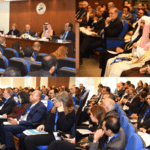
Celebratory Conference of the 50th Anniversary of UNCITRAL
Dec 09 2017
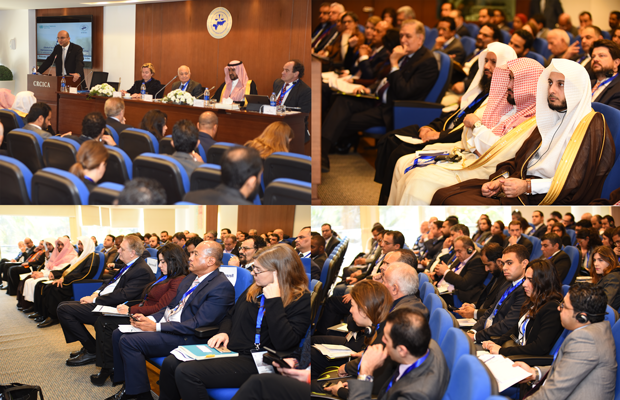 "Global Inclusion and Dispute Resolution: Harmonizing Trends in International Arbitration
Since its inception in 1979, the CRCICA has developed historical ties of cooperation with the United Nations Commission on International Trade Law (UNCITRAL) in support of its role in the harmonization and modernization of international trade law. For decades, CRCICA took the regional lead to share with UNCITRAL the celebrations of its milestones, and with pride, organized jointly with the UNCITRAL the regionally exclusive celebratory Conference of its 50th Anniversary under the innovating theme: Global Inclusion and Dispute Resolution Harmonizing Trends in International Arbitration on 9-10 December 2017 at CRCICA Auditorium, Cairo-Egypt. Similar celebratory conferences were held in Austria, Cameroon and India. The Cairo version is the exclusive one in the Middle East and North Africa (MENA) Region.
The conference addressed the UNCITRAL contributions in the field of dispute settlement over 50 years with particular focus on the New York Convention and its applications, the UNCITRAL Model Arbitration Law and Arbitration Rules.
Such a diverse agenda echoes a similar diversity of speakers representing different countries such as Switzerland, Spain, the Netherlands, Austria, Malaysia, Sweden, France, Turkey, Cameroon, Saudi Arabia, Bahrain, Kuwait, Lebanon and Egypt.
The conference was sponsored by Youssef & Partners Attorneys and Zulficar & Partners Law Firm. Supporting firms were Rizkana & Partners, Al Tamimi & Co., Badran Law Office, and Byo Ojo & Co. Media partners were GAR, TDM OGEMid, The Law, and Law Today.
Attendees, totaling 125, came from 20 countries, namely: Egypt, Jordan, Lebanon, Saudi Arabia, Bahrain, Sudan, Qatar, France, Ireland, Switzerland, Kuwait, Spain, Cameroon, Malaysia, Sweden, Libya, Germany, Nigeria, Mexico, and The Netherlands.
Conference Agenda.
During the Conference, the historic signing ceremony of the CRCICA/PCA cooperation agreement took place
"Global Inclusion and Dispute Resolution: Harmonizing Trends in International Arbitration
Since its inception in 1979, the CRCICA has developed historical ties of cooperation with the United Nations Commission on International Trade Law (UNCITRAL) in support of its role in the harmonization and modernization of international trade law. For decades, CRCICA took the regional lead to share with UNCITRAL the celebrations of its milestones, and with pride, organized jointly with the UNCITRAL the regionally exclusive celebratory Conference of its 50th Anniversary under the innovating theme: Global Inclusion and Dispute Resolution Harmonizing Trends in International Arbitration on 9-10 December 2017 at CRCICA Auditorium, Cairo-Egypt. Similar celebratory conferences were held in Austria, Cameroon and India. The Cairo version is the exclusive one in the Middle East and North Africa (MENA) Region.
The conference addressed the UNCITRAL contributions in the field of dispute settlement over 50 years with particular focus on the New York Convention and its applications, the UNCITRAL Model Arbitration Law and Arbitration Rules.
Such a diverse agenda echoes a similar diversity of speakers representing different countries such as Switzerland, Spain, the Netherlands, Austria, Malaysia, Sweden, France, Turkey, Cameroon, Saudi Arabia, Bahrain, Kuwait, Lebanon and Egypt.
The conference was sponsored by Youssef & Partners Attorneys and Zulficar & Partners Law Firm. Supporting firms were Rizkana & Partners, Al Tamimi & Co., Badran Law Office, and Byo Ojo & Co. Media partners were GAR, TDM OGEMid, The Law, and Law Today.
Attendees, totaling 125, came from 20 countries, namely: Egypt, Jordan, Lebanon, Saudi Arabia, Bahrain, Sudan, Qatar, France, Ireland, Switzerland, Kuwait, Spain, Cameroon, Malaysia, Sweden, Libya, Germany, Nigeria, Mexico, and The Netherlands.
Conference Agenda.
During the Conference, the historic signing ceremony of the CRCICA/PCA cooperation agreement took place
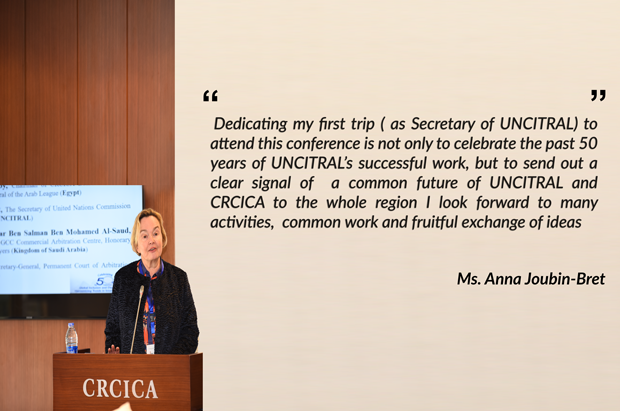
CRCICA Arbitration Week
Dec 09 2017
The week of 9 December was exceptionally busy at CRCICA where five different arbitration events were held consecutively, bringing the works and regional inclinations of six international institutions, UNCITRAL, ICCA, IBA, ABA, BIAC and KLRCA (now Asian International Arbitration Centre“AIAC”), under CRCICA limelight.
View Details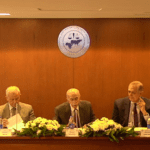
Second Cairo ICCA New York Convention Roadshow, 2 December 2017, Cairo – Egypt
Dec 02 2017
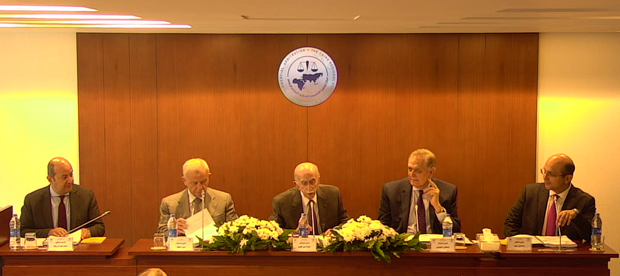 On 2 December 2017, the Cairo Regional Centre for International Commercial Arbitration (CRCICA) organized the Second Cairo ICCA New York Convention (NYC) Roadshow in cooperation with ICCA and the National Centre for Judicial Studies. The event took place at the CRCICA Conference Centre in Cairo, Egypt.
The event was attended by 47 Egyptian judges from the Egyptian Court of Cassation, the Cairo Court of Appeal, the Conseil d’Etat, the first instance court, and the economic court in addition to public prosecutors.
Discussions were led by ten arbitration and post-arbitral proceedings practitioners (seven of which are sittings judges): Judge Mohamed Amin El Mahdy (former Chief Justice of the Egyptian Conseil d’Etat), Judge Omar Hafiz, Vice- Minister of Justice for the National Center for Judicial Studies, Judge Mustafa Al-Behbitty (Vice- Minister of Justice for Arbitration Department and International Disputes Affairs), Prof. Dr. Ahmed S. El Kosheri (Founding Partner, Kosheri, Rashed and Riad, Cairo-Egypt and member of CRCICA Board and Advisory Committee), Prof. Dr. Borham Attallah (Civil Law Professor, Faculty of Law, Alexandria University), Judge Borhan Amrallah (former President of the Cairo Court of Appeal), Judge Nabil Omran (Vice-President of the Court of Cassation); Judge Ismail Al-Ziady (Head of the Commercial Circuit No 7 at Cairo Court of Appeal), ICCA Governing Board member, Dr. Mohamed Abdel Raouf (Head of Arbitration at Abdelraouf Law Firm) in addition to Dr. Ismail Selim, CRCICA Director.
The program of the one-day event commenced with opening speeches followed by three sessions. The first session included an overview of the New York Convention, its objectives, means of interpretation and salient comparative judicial application. The second session addressed the role of the Arbitration Department within the Ministry of Justice in the enforcement of the arbitration awards guided by the New York Convention, especially its supervision of the courts’ clerks. The third session focused on the role of the national judge in the international arbitration process from the perspectives of both practitioners and judges.
The sessions were followed by three panel-led discussions. The first panel covered Article I to IV of the New York Convention, the second focused on Article V of the New York Convention and the third panel discussed Article VII of the New York Convention, with special emphasis on the relationship between the New York Convention and the Riyadh Convention of 1983; and the fourth session discussed the enforcement of foreign arbitral awards set aside at the seat of arbitration.
The texts of the New York Convention, the Egyptian Arbitration Law, the relevant provisions of the Egyptian law on civil procedure, as well as the Arabic version of ICCA’s Guide to the Interpretation of the 1958 New York Convention (available to download at http://www.arbitration-icca.org/publications/NYC_Guide.html) were made available to participants, in addition to five relevant judgments rendered by the Egyptian Court of Cassation and the Cairo Court of Appeal and three doctrinal articles regarding the application of the NYC.
Participants agreed that the Roadshow was a great success, and it generated interesting discussions on topics such as the scope of discretion entrusted to national judges in enforcing arbitral awards while one or more of the causes of refusal of enforcement exist; the importance of having a harmonized application of the provisions of the New York Convention in accordance with the standards and principles of interpretation of international law; the public policy defence under the New York Convention; and an analysis of the position of the French and American courts regarding the enforcement of arbitral awards that have been set aside at the seat.
CRCICA expresses its thanks to Judge Nabil Omran for his all-encompassing PowerPoint presentation and discussions. CRCICA also acknowledges the high quality of the stimulating discussions conducted by Prof. Dr. Ahmed S. El Kosheri, Judge Borhan Amrallah, Prof. Dr. Borham Attallah, Dr. Mohamed Abdel Raouf and Judge Ismail Al-Ziady. CRCICA also expresses its gratitude to Judge Mustapha Al-Behbitty for his presentation and clarification of the role played by the arbitration department within the Ministry of Justice (mainly related to the regulation of the procedures for depositing the arbitration awards with the competent court, and is not intended to impose supervision upon judges when subsequently deciding upon the enforcement of awards). Further, CRCICA thanks the Co-organizers, Dr. Mohamed Abdel Raouf (ICCA Governing Board member) & Judge Omar Hafiz (Vice Minister of Justice for the National Center for Judicial Studies) for their tremendous efforts in successfully conducting the second Cairo NYC Roadshow.
CRCICA dialogue with judges deciding upon post arbitral proceedings
On 2 December 2017, the Cairo Regional Centre for International Commercial Arbitration (CRCICA) organized the Second Cairo ICCA New York Convention (NYC) Roadshow in cooperation with ICCA and the National Centre for Judicial Studies. The event took place at the CRCICA Conference Centre in Cairo, Egypt.
The event was attended by 47 Egyptian judges from the Egyptian Court of Cassation, the Cairo Court of Appeal, the Conseil d’Etat, the first instance court, and the economic court in addition to public prosecutors.
Discussions were led by ten arbitration and post-arbitral proceedings practitioners (seven of which are sittings judges): Judge Mohamed Amin El Mahdy (former Chief Justice of the Egyptian Conseil d’Etat), Judge Omar Hafiz, Vice- Minister of Justice for the National Center for Judicial Studies, Judge Mustafa Al-Behbitty (Vice- Minister of Justice for Arbitration Department and International Disputes Affairs), Prof. Dr. Ahmed S. El Kosheri (Founding Partner, Kosheri, Rashed and Riad, Cairo-Egypt and member of CRCICA Board and Advisory Committee), Prof. Dr. Borham Attallah (Civil Law Professor, Faculty of Law, Alexandria University), Judge Borhan Amrallah (former President of the Cairo Court of Appeal), Judge Nabil Omran (Vice-President of the Court of Cassation); Judge Ismail Al-Ziady (Head of the Commercial Circuit No 7 at Cairo Court of Appeal), ICCA Governing Board member, Dr. Mohamed Abdel Raouf (Head of Arbitration at Abdelraouf Law Firm) in addition to Dr. Ismail Selim, CRCICA Director.
The program of the one-day event commenced with opening speeches followed by three sessions. The first session included an overview of the New York Convention, its objectives, means of interpretation and salient comparative judicial application. The second session addressed the role of the Arbitration Department within the Ministry of Justice in the enforcement of the arbitration awards guided by the New York Convention, especially its supervision of the courts’ clerks. The third session focused on the role of the national judge in the international arbitration process from the perspectives of both practitioners and judges.
The sessions were followed by three panel-led discussions. The first panel covered Article I to IV of the New York Convention, the second focused on Article V of the New York Convention and the third panel discussed Article VII of the New York Convention, with special emphasis on the relationship between the New York Convention and the Riyadh Convention of 1983; and the fourth session discussed the enforcement of foreign arbitral awards set aside at the seat of arbitration.
The texts of the New York Convention, the Egyptian Arbitration Law, the relevant provisions of the Egyptian law on civil procedure, as well as the Arabic version of ICCA’s Guide to the Interpretation of the 1958 New York Convention (available to download at http://www.arbitration-icca.org/publications/NYC_Guide.html) were made available to participants, in addition to five relevant judgments rendered by the Egyptian Court of Cassation and the Cairo Court of Appeal and three doctrinal articles regarding the application of the NYC.
Participants agreed that the Roadshow was a great success, and it generated interesting discussions on topics such as the scope of discretion entrusted to national judges in enforcing arbitral awards while one or more of the causes of refusal of enforcement exist; the importance of having a harmonized application of the provisions of the New York Convention in accordance with the standards and principles of interpretation of international law; the public policy defence under the New York Convention; and an analysis of the position of the French and American courts regarding the enforcement of arbitral awards that have been set aside at the seat.
CRCICA expresses its thanks to Judge Nabil Omran for his all-encompassing PowerPoint presentation and discussions. CRCICA also acknowledges the high quality of the stimulating discussions conducted by Prof. Dr. Ahmed S. El Kosheri, Judge Borhan Amrallah, Prof. Dr. Borham Attallah, Dr. Mohamed Abdel Raouf and Judge Ismail Al-Ziady. CRCICA also expresses its gratitude to Judge Mustapha Al-Behbitty for his presentation and clarification of the role played by the arbitration department within the Ministry of Justice (mainly related to the regulation of the procedures for depositing the arbitration awards with the competent court, and is not intended to impose supervision upon judges when subsequently deciding upon the enforcement of awards). Further, CRCICA thanks the Co-organizers, Dr. Mohamed Abdel Raouf (ICCA Governing Board member) & Judge Omar Hafiz (Vice Minister of Justice for the National Center for Judicial Studies) for their tremendous efforts in successfully conducting the second Cairo NYC Roadshow.
CRCICA dialogue with judges deciding upon post arbitral proceedings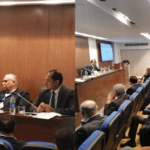
The Stock Market in Egypt, 29 November 2017
Nov 29 2017
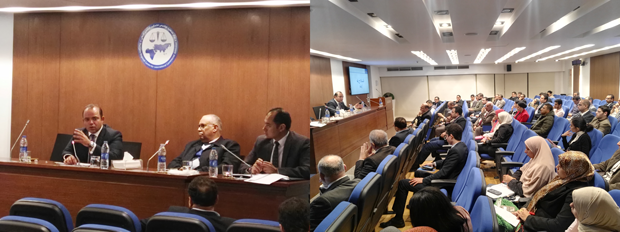 Held on 29 November 2017, the CIArb Cairo Wednesday One Seminar titled “The Stock Market in Egypt” was delivered by Mr. Mohamed Farid, Chairman of the Egyptian Stock Exchange (EGX). Mr. Farid presented the role of the stock market and its importance in the process of economic reform in Egypt. He outlined the mechanism and process of settling disputes in the stock market and focused on the role of the Investor Protection Fund which was established to cover the actual losses incurred by investors against non-commercial risks.
At the end of the lecture, Mr. Farid highlighted some features of the stock market’s future plans which include extending its role in financing national projects and relying on artificial intelligence and data mining techniques. Lively discussions were raised following the speech.
Held on 29 November 2017, the CIArb Cairo Wednesday One Seminar titled “The Stock Market in Egypt” was delivered by Mr. Mohamed Farid, Chairman of the Egyptian Stock Exchange (EGX). Mr. Farid presented the role of the stock market and its importance in the process of economic reform in Egypt. He outlined the mechanism and process of settling disputes in the stock market and focused on the role of the Investor Protection Fund which was established to cover the actual losses incurred by investors against non-commercial risks.
At the end of the lecture, Mr. Farid highlighted some features of the stock market’s future plans which include extending its role in financing national projects and relying on artificial intelligence and data mining techniques. Lively discussions were raised following the speech.